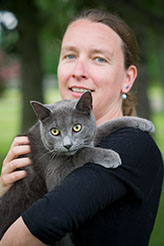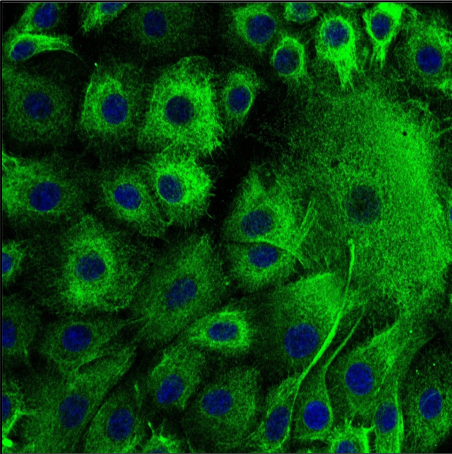Gerlinde Van de Walle, DVM, PhD

Department of Microbiology and Immunology
Baker Institute for Animal Health
Alfred H. Caspary Professor
Baker Institute for Animal Health
Office: 607.256.5624
Email: grv23@cornell.edu
Dr. Van de Walle's Work
To better understand the pathogenesis of breast cancer and viruses causing liver disease, and to explore the value of stem cells to improve healing and fight infections.
The use of a comparative mammary gland model to study breast cancer
Key papers:
Arianna P. Bartlett, Rebecca M. Harman, Jennifer R. Weiss, Gerlinde R. Van de Walle. (2022). Establishment and characterization of equine mammary organoids using a method translatable to other non-traditional model species. In collection: Reproductive biology. Techniques and Resources. 12 April 2022
Ledet MM, Harman RM, Fan JC, Schmitt-Matzen E, Diaz-Rubio ME, Zhang S, Van de Walle GR. Secreted sphingomyelins modulate low mammary cancer incidence observed in certain mammals. Sci Rep. 2020 Nov 25;10(1):20580. doi: 10.1038/s41598-020-77639-1. PubMed PMID: 33239740; PubMed Central PMCID: PMC7689471.
Ledet MM, Oswald M, Anderson R, Van de Walle GR. Differential signaling pathway activation in 7,12-dimethylbenz[a] anthracene (DMBA)-treated mammary stem/progenitor cells from species with varying mammary cancer incidence. Oncotarget. 2018 Aug 28;9(67):32761-32774. doi: 10.18632/oncotarget.25988. eCollection 2018 Aug 28. PubMed PMID: 30214683; PubMed Central PMCID: PMC6132353.
Bussche L, Rauner G, Antonyak M, Syracuse B, McDowell M, Brown AMC, Cerione RA, Van de Walle GR. Microvesicle-mediated Wnt/β-Catenin Signaling Promotes Interspecies Mammary Stem/Progenitor Cell Growth. J Biol Chem. 2016 Nov 18;291(47):24390-24405. doi: 10.1074/jbc.M116.726117. Epub 2016 Oct 12. PubMed PMID: 27733685; PubMed Central PMCID: PMC5114396.
Explore the secretes of stem cells to improve healing and fight infections
 Collaboration seeks new stem cell treatment for mastitis
Collaboration seeks new stem cell treatment for mastitis
Novel approach to udder infection is target of new project
Key papers:
Rebecca M Harman, Katherine A Churchill, Mason C Jager, Gerlinde R Van de Walle. (2021). The equine mesenchymal stromal cell secretome inhibits equid herpesvirus type 1 strain Ab4 in epithelial cells. Res Vet Sci. 2021 Dec;141:76-80.
Charlotte Marx, Sophia Gardner, Rebecca M Harman, Bettina Wagner, Gerlinde R Van de Walle. (2021). Mesenchymal stromal cell-secreted CCL2 promotes antibacterial defense mechanisms through increased antimicrobial peptide expression in keratinocytes. Stem Cells Transl Med. 2021 Dec;10(12):1666-1679.
Marx C, Gardner S, Harman RM, Van de Walle GR. The mesenchymal stromal cell secretome impairs methicillin-resistant Staphylococcus aureus biofilms via cysteine protease activity in the equine model. Stem Cells Transl Med. 2020 Jul;9(7):746-757. doi: 10.1002/sctm.19-0333. Epub 2020 Mar 26. PubMed PMID: 32216094; PubMed Central PMCID: PMC7308642.
Harman RM, He MK, Zhang S, VAN DE Walle GR. Plasminogen activator inhibitor-1 and tenascin-C secreted by equine mesenchymal stromal cells stimulate dermal fibroblast migration in vitro and contribute to wound healing in vivo. Cytotherapy. 2018 Aug;20(8):1061-1076. doi: 10.1016/j.jcyt.2018.06.005. Epub 2018 Aug 4. PubMed PMID: 30087008.
Curtis TM, Hannett JM, Harman RM, Puoplo NA, Van de Walle GR. The secretome of adipose-derived mesenchymal stem cells protects SH-SY5Y cells from arsenic-induced toxicity, independent of a neuron-like differentiation mechanism. Neurotoxicology. 2018 Jul;67:54-64. doi: 10.1016/j.neuro.2018.04.009. Epub 2018 Apr 13. PubMed PMID: 29660375.
Ledet MM, Vasquez AK, Rauner G, Bichoupan AA, Moroni P, Nydam DV, Van de Walle GR. The secretome from bovine mammosphere-derived cells (MDC) promotes angiogenesis, epithelial cell migration, and contains factors associated with defense and immunity. Sci Rep. 2018 Mar 29;8(1):5378. doi: 10.1038/s41598-018-23770-z. PubMed PMID: 29599438; PubMed Central PMCID: PMC5876384.
Harman RM, Yang S, He MK, Van de Walle GR. Antimicrobial peptides secreted by equine mesenchymal stromal cells inhibit the growth of bacteria commonly found in skin wounds. Stem Cell Res Ther. 2017 Jul 4;8(1):157. doi: 10.1186/s13287-017-0610-6. PubMed PMID: 28676123; PubMed Central PMCID: PMC5496374.
Bussche L, Harman RM, Syracuse BA, Plante EL, Lu YC, Curtis TM, Ma M, Van de Walle GR. Microencapsulated equine mesenchymal stromal cells promote cutaneous wound healing in vitro. Stem Cell Res Ther. 2015 Apr 11;6:66. doi: 10.1186/s13287-015-0037-x. PubMed PMID: 25889766; PubMed Central PMCID: PMC4413990.
Study the pathogenesis of viruses causing liver disease in horses
Key papers:
Tomlinson JE, Jager M, Struzyna A, Laverack M, Fortier LA, Dubovi E, Foil LD, Burbelo PD, Divers TJ, Van de Walle GR. Tropism, pathology, and transmission of equine parvovirus-hepatitis. Emerg Microbes Infect. 2020;9(1):651-663. doi: 10.1080/22221751.2020.1741326. eCollection 2020. PubMed PMID: 32192415; PubMed Central PMCID: PMC7144241.
Tomlinson JE, Van de Walle GR, Divers TJ. What Do We Know About Hepatitis Viruses in Horses?. Vet Clin North Am Equine Pract. 2019 Aug;35(2):351-362. doi: 10.1016/j.cveq.2019.03.001. Epub 2019 May 10. Review. PubMed PMID: 31084975.
Some highlights of previous work in the Van de Walle lab:
An ongoing focus of Dr. Gerlinde Van de Walle’s research is exploring novel treatments for diseases important in veterinary medicine. Some of that work has focused on finding drugs suitable for treating mammary cancer in small companion animals and for treating ocular herpesvirus infections in cats – all of which can also benefit similar diseases in humans and other animals.
- In an attempt to identify new drugs to treat mammary cancer in dogs and cats, Van de Walle and her colleagues studied the effects of human epigenetic cancer drugs on tumors in dogs and cats. Based on promising results using dog and cat mammary cancer cells grown in the lab and the evaluation of these drugs in rodent models of canine and feline mammary cancer, next steps include the evaluation of the safety of these drugs in healthy dogs and cats. These steps are necessary to push these drugs along to eventual use in treating canine and feline mammary cancer in the clinic.
Ledet MM, Anderson R, Harman R, Muth A, Thompson PR, Coonrod SA, Van de Walle GR. BB-Cl-Amidine as a novel therapeutic for canine and feline mammary cancer via activation of the endoplasmic reticulum stress pathway. BMC Cancer. 2018 Apr 12;18(1):412. doi: 10.1186/s12885-018-4323-8. PubMed PMID: 29649984; PubMed Central PMCID: PMC5898062.
- Feline herpes virus 1 (FHV-1) is a frequent cause of eye infections in cats, but the drugs available to treat these infections must be applied multiple times a day and there is scant scientific evidence to support their use. To predictively test the efficacy of novel antivirals, the Van de Walle lab developed a cornea model system and used this successfully to show that antiretroviral drug raltegravir, commonly used in humans to treat HIV infections, is also effective against FHV-1 infection. They then went on to test the efficacy of this drug in cats with FHV-1 eye infections. Next steps include to use the cornea model system for identifying additional drugs against common ocular pathogens in cats.


